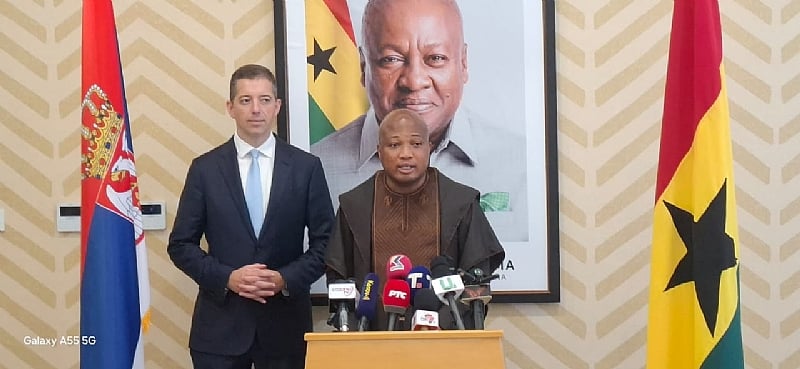Ghana and Serbia have embarked on a significant bilateral partnership, committing to bolster cooperation across diverse sectors, including trade, labor mobility, military collaboration, education, technology exchange, and climate change mitigation. This burgeoning relationship, announced by Ghana’s Foreign Minister Samuel Okudzeto Ablakwa, signals a renewed focus on mutual growth and development, leveraging each nation’s strengths and addressing key challenges. Serbia, grappling with an aging population, views Ghana’s youthful demographic as a valuable resource and plans to issue 100,000 work permits this year, opening doors for Ghanaian workers to gain international experience and contribute to Serbia’s economy. This reciprocal approach also extends to educational exchange, with Serbia awarding scholarships to Ghanaian students and Ghana reciprocating with opportunities for Serbian students interested in African studies. This multifaceted approach underlines a commitment to shared prosperity and human capital development.
The collaboration extends beyond human resources to encompass crucial economic sectors. Both nations, having discovered lithium reserves, aim to share technological expertise in the mining industry, fostering innovation and sustainable resource management. Furthermore, Ghana has invited Serbian investors and entrepreneurs to explore the diverse opportunities within its growing economy, emphasizing the nation’s openness to business and partnership. This invitation reflects Ghana’s commitment to attracting foreign investment and promoting mutually beneficial economic ventures. The proposed 24-hour economy model, a key initiative of Ghana’s development agenda, has also piqued Serbia’s interest, signaling potential collaboration in shaping innovative economic strategies.
The partnership builds upon historical ties dating back to the era of Presidents Kwame Nkrumah and Josip Broz Tito, representing a revitalization of a long-standing relationship. Serbia’s Foreign Minister, Marko Duric, affirmed Ghana’s significance as a regional partner, emphasizing the shared commitment to deepening cooperation for economic advancement. This historical context underscores the enduring nature of the relationship and the potential for sustained collaboration. The current visit, marked by a series of high-level meetings, is expected to culminate in several agreements solidifying the partnership across multiple sectors. This structured approach reflects the seriousness of the commitment and the intent to translate discussions into concrete actions.
Education remains a cornerstone of the collaborative effort, with Serbia committing to expanding scholarship opportunities for Ghanaian students. This focus on education highlights the importance of human capital development in fostering long-term growth and mutual understanding. Moreover, Serbia, currently presiding over the Global Partnership for Artificial Intelligence, seeks to engage Ghana and the wider African continent in shaping the future of this transformative technology. This inclusive approach underscores the belief in shared governance and the importance of diverse perspectives in navigating the complexities of emerging technologies. The collaboration extends beyond economic and educational spheres to encompass military cooperation, recognizing the importance of shared security interests and the potential for collaborative efforts in maintaining regional stability.
The three-day visit by the Serbian delegation includes meetings with various Ghanaian ministries, including Food and Agriculture, Tourism, Sports, and Defense, further broadening the scope of the partnership. This comprehensive engagement reflects the breadth of the collaboration and the intent to explore synergistic opportunities across diverse sectors. These meetings will provide platforms for detailed discussions on specific areas of cooperation, paving the way for concrete agreements and action plans. The engagement with Ghana’s Parliament further strengthens the institutional framework of the partnership, ensuring legislative support and fostering long-term stability in the relationship.
In conclusion, the burgeoning partnership between Ghana and Serbia represents a strategic alliance built on mutual respect, shared interests, and a commitment to sustainable development. This multifaceted collaboration, encompassing trade, labor mobility, military cooperation, education, technology exchange, and climate change mitigation, reflects a comprehensive approach to fostering growth and addressing shared challenges. The focus on human capital development, technological innovation, and economic diversification underscores the long-term vision of this partnership, while the historical context provides a strong foundation for sustained collaboration. The ongoing high-level engagements and planned agreements signal a concrete commitment to translating shared aspirations into tangible outcomes, promising a future of mutual benefit and shared prosperity for both nations.


